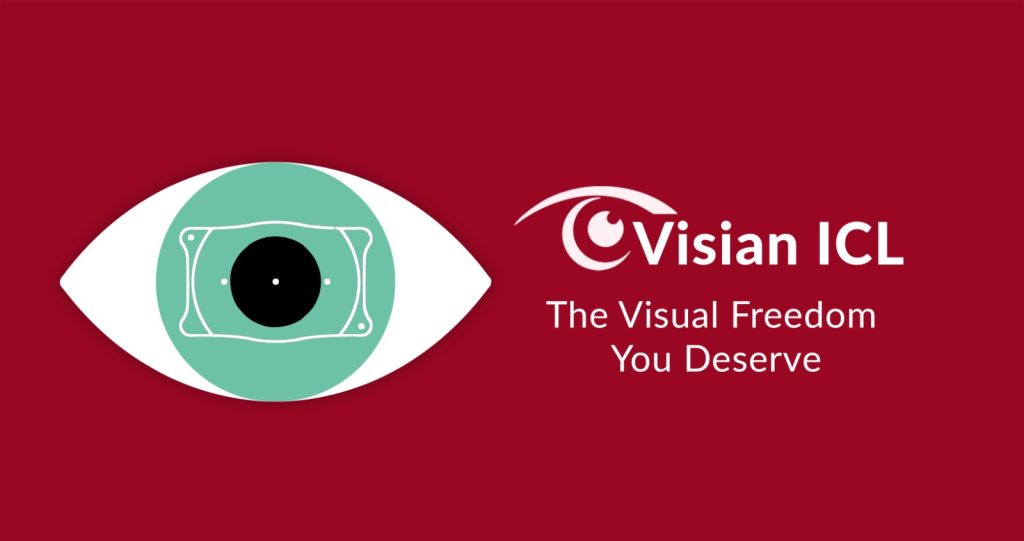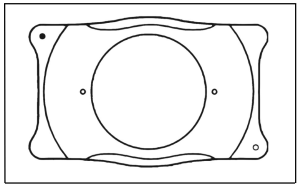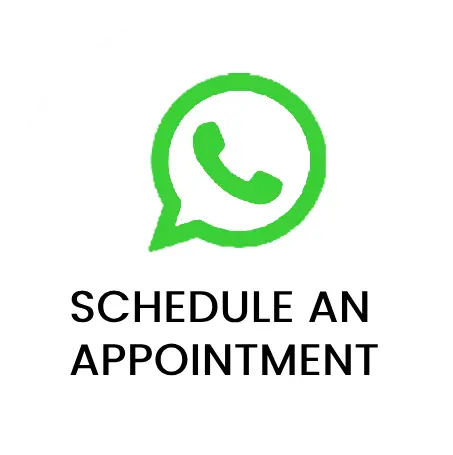ICL Surgery
ICL surgery, also known as EVO Implantable Collamer or Implantable Contact Lens surgery, serves as another option to laser vision correction surgery to remove specs and contact lenses from your daily life.
During this procedure, a specially trained eye surgeon permanently implants maintenance-free contact lenses into your eyes.
When is ICL surgery recommended? If you’re nearsighted, meaning you can see objects close to you clearly but struggle with distant vision, corrective treatment may be necessary.
Options include glasses, contact lenses, LASIK, or ICL surgery. The suitability of treatment options depends on the severity of your nearsightedness and overall eye health.

There are two main types of ICL surgery:
1. EVO ICL Soft Lens:
- This type of lens is made from a flexible Collamer – co-polymer collagen material. Collagen naturally found in the body, thus reducing the risk of adverse reactions. It is also the only ICL that is US FDA approved.
- During the procedure, the surgeon makes a small opening in the cornea and inserts the ICL between the iris and the natural lens. Stitches are typically not required.

2. Intraocular Lens:
- This variation of ICL surgery is tailored for patients with severe nearsightedness who may not be candidates for LASIK. The lens is placed between the cornea and the iris to improve the eye’s focusing ability.
- Surgeons use tiny stitches to close the incision to ensure the lens stays in place. However, with this type of lens, overall function may decrease with age, and patients may require reading glasses later in life. If a patient with an intraocular lens develops cataracts, the lens must be removed for corrective surgery.

Both types of ICL surgery preserve the eye’s natural lens and cornea, enhancing vision without the need for removable glasses or contacts.
Comparison of Refractive Procedures: EVO ICL, LASIK, and PRK
EVO ICL (Implantable Collamer Lens)
- Overview: A lens implanted inside the eye that corrects refractive errors without removing corneal tissue, ideal for those with high myopia or thin corneas.
- Candidates: Best for individuals seeking a reversible option.
- Procedure: Quick, painless, and typically under 30 minutes.
- Recovery: Rapid recovery with immediate vision improvement; most return to daily activities the next day.
- Reversibility: The lens can be removed or replaced.
LASIK (Laser-Assisted In Situ Keratomileusis)
- Overview: Reshapes the cornea to correct myopia, hyperopia, and astigmatism.
- Candidates: Suitable for mild to moderate refractive errors but not for those with thin corneas.
- Procedure: Creates a corneal flap and reshapes underlying tissue.
- Recovery: Quick visual recovery, often achieving optimal vision within 24 to 48 hours.
- Considerations: Involves tissue removal, which may pose risks for some.
PRK (Photorefractive Keratectomy)
- Overview: Removes the top layer of the cornea without creating a flap.
- Candidates: Ideal for those with thin corneas.
- Procedure: The epithelium is removed, followed by reshaping the cornea with a laser.
- Recovery: Longer visual recovery, with discomfort for a few days; significant improvement seen within a week.
- Considerations: May require more time off work but has fewer risks related to corneal flaps.
EVO ICL Candidacy: Who is Suitable?
The EVO ICL (Implantable Collamer Lens) is an innovative vision correction option ideal for individuals with high myopia and moderate astigmatism, especially when other methods aren’t suitable.
It’s a great choice for those with thin corneas, as it doesn’t alter corneal tissue. Candidates should be at least 21 years old, have stable vision for one year, and have healthy eyes, free from conditions like glaucoma or cataracts. This procedure also suits active individuals seeking a reversible option.
To find out if EVO ICL is right for you, consult our specialists at Envision Lasik Center. They will assess your eye health and vision goals for personalized recommendations. Contact us today to explore how EVO ICL can enhance your visual clarity and quality of life!
Is ICL Surgery Permanent?
- In most cases, yes. However, it is possible to remove the lenses, but this requires another surgery. If you opt to have the lenses removed after ICL surgery, your vision will go back to its original vision within a few weeks because no other structures in your eye have been changed unlike LASIK that removed part of your cornea for correction.
- If you’re looking for expertise in this field, finding the best ICL surgery in Hyderabad is essential to ensure you receive the highest quality care. Envision LASIK Centre is renowned for its advanced techniques and personalized approach, providing excellent guidance and treatment for your long-term vision needs.
What are the Risks and Benefits to ICL Surgery?
Risks
- Like any medical procedure, ICL surgery carries risks. Discuss the pros and cons with your eye doctor before making a decision.
- Potential Risks include: Vision loss, Changes in Vision, Additional Surgery, Increase in Eye Pressure following the Surgery, Over or Under Correction, Retinal Detachment, Infection.
- It is important to be informed of the risks, but overall the percentage of patients potentially experiencing these complications is low. Therefore it is important to have your ICL surgery with an expert, like EnVision Lasik Centre, where we can determine if you are a good candidate for this type of procedure.
Benefits
- Millions of people have had ICL surgery worldwide because of the benefit to getting rid of specs and contact lenses.
- Here are some of the key benefits in why patients elect to have the ICL.
- Provides sharp, clear vision
- 20 to 30 minute procedure
- Quick recovery time
- Removable by your ophthalmologist
- Offers UV protection
- Not visible once in place
- Can treat a wide range of nearsightedness (myopia), farsightedness (hyperopia) with or without astigmatism
- For patients who may not be candidates for LASIK or other vision correction procedures due to thin corneas or high prescriptions
- Does not cause or worsen dry eye syndrome
- EVO ICL is US FDA Approved and over 3 million have been implanted worldwide in over 76 countries
Cost of icl surgery in Hyderabad
The cost of ICL surgery in Hyderabad typically ranges between ₹75,000 to ₹1,50,000 per eye. The final cost may vary based on several factors, such as the type of lens used, the surgeon’s expertise, and the quality of hospital facilities. Premium options like the EVO ICL Soft Lens, which is US FDA-approved, can slightly influence pricing due to its advanced technology and safety profile.
While the upfront cost may seem significant, it’s a worthwhile investment for those seeking long-term freedom from glasses or contact lenses. ICL surgery not only provides clear vision but also preserves the eye’s natural structure, making it a safe choice. Additionally, the flexibility to remove or replace the lens further adds value to this procedure.
Choosing a trusted eye care center in Hyderabad ensures you receive top-quality treatment and expert care, justifying the cost for improved vision and quality of life.
Why Choose Envision LASIK Centre for ICL Surgery?
Envision LASIK Centre offers exceptional care for ICL surgery with experienced surgeons and cutting-edge technology. Our team provides personalized treatment plans tailored to your unique vision needs.
With a proven track record in vision correction and a commitment to safety and precision, we ensure top-quality care. Trust Envision LASIK Centre for reliable results, expert guidance, and a better quality of life through improved vision.
Frequently Asked Questions
This retrospective study revealed that ICL implantation was safe and effective for five years or more. The safety and effectiveness indices were 1.01 and 0.99, respectively. The ICL placement in the eye was considerably stable.
ICL eye surgery is done with a local anesthetic, eyedrops, to numb the eyes. No shot or injection is required. Yes, while this means that you are awake during the procedure, there is no pain, and patients are very comfortable throughout ICL surgery.
At Envision Lasik Centre, we weave precision, safety, and unparalleled patient care into the fabric of every vision journey, guaranteeing a seamless and triumphant experience for all. Rely on us for avant-garde technology, seasoned surgeons, and a steadfast dedication to illuminating lives with crystal-clear vision.
People who want a flexible and biocompatible vision correction option, as well as many patients who are not candidates for laser vision correction, find that EVO ICL is the right procedure for them.
Ideal candidates for EVO ICL:
- Are between the ages of 21 and 45
- Are seeking a vision correction solution for moderate to severe nearsightedness (with or without astigmatism)
- Have a stable prescription that has not changed within the last year
- Have good ocular health with no history of glaucoma, iritis, or diabetic eye disease
Vision correction with the EVO ICL is an outpatient procedure that typically takes 20 to 30 minutes. After an initial exam with your ophthalmologist to determine that the EVO ICL is right for you, you will schedule your procedure. On the day of the procedure, your eyes will be numbed with an anesthetic eye drop and your refractive surgeon will implant the ICL between the iris (colored part of the eye) and the natural lens. Your surgeon will likely schedule a follow-up appointment the same day as the procedure.
Yes; the EVO ICL is intended to provide permanent vision correction, but it can be removed or upgraded by your surgeon.
No, patients should not feel the lens as it does not adhere to any structures within the eye and does not move once in place.
No, the EVO lens is placed behind your iris where only your eye doctor will be able to detect it.


